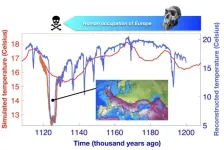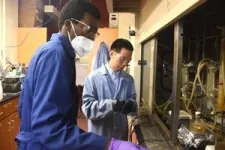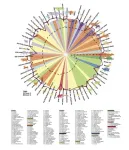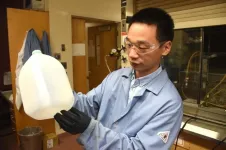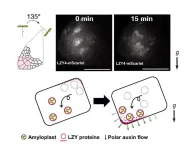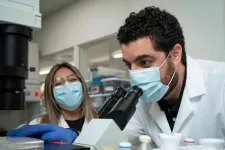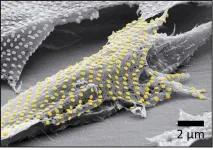How a massive North Atlantic cooling event disrupted early human occupation in Europe
2023-08-10
(Press-News.org)
A new study published in the journal Science finds that around 1.12 million years ago a massive cooling event in the North Atlantic and corresponding shifts in climate, vegetation and food resources disrupted early human occupation of Europe.
The study published by an international group of scientists from the UK, South Korea and Spain presents observational and modelling evidence documenting that unprecedented climate stress changed the course of early human history.
Archaic humans, known as Homo erectus moved from Africa into central Eurasia around 1.8 million years. From there on they spread towards western Europe, reaching the Iberian peninsula around 1.5 million years ago (Ma). Experiencing initially rather mild climatic conditions, these groups eventually established a foothold in southern Europe, as documented by several dated fossils and stone tools from this period. But given the increasing intensity of glacial cycles in Europe from 1.2 Ma onwards, it remains unknown for how long early humans lived in this area and whether the occupation was interrupted by worsening climate conditions.
To better understand the environmental conditions, which early human species in Europe experienced, the team of pollen experts, oceanographers, climate modelers, archeologists, and anthropologists combined data of a deep ocean sediment cores from the eastern subtropical Atlantic with new supercomputer climate model and human habitat model simulations covering the period of the depopulation event.
Sieving through thousands of small plant pollen stored in the ocean sediment core and analyzing preserved temperature-sensitive organic compounds left by tiny algae, which lived over a million years ago, the scientists discovered that around 1.127 million years ago, the climate over the eastern North Atlantic and the adjacent land suddenly cooled by 7oC.
“This massive cooling marks one of the first terminal stadial events in the paleoclimatic record. It occurred during the last phase of a glacial cycle, when ice-sheets disintegrated, releasing large amounts of freshwater into the ocean, and causing ocean circulation changes and a southward expansion of sea ice”, says Prof. Chronis Tzedakis from University College London (UCL), senior author of the study.
The pollen data extracted from the ocean sediment core further add to this scenario “Rivers and winds bring tiny pollen from the adjacent land to the ocean, where they sink and get deposited in the deep ocean. According to our ocean sediment core pollen analysis, the North Atlantic cooling event switched western European vegetation to an inhospitable semi-desert landscape.”, adds Dr. Vasiliki Margari from UCL, lead author of the study.
To quantify how early humans may have reacted to such an unprecedented climate anomaly, scientists from the IBS Center for Climate Physics (ICCP) in South Korea, conducted new computer model simulations for this period. By adding glacial freshwater to the North Atlantic, Dr. Kyung-Sook Yun, and Ms. Hyuna Kim from the ICCP were able to reproduce key features of the terminal stadial event, such as the cooling (Fig. 1) and drying over southern Europe. “We then used this global climate model simulation as an input for a human habitat model, which determines whether certain environmental conditions were suitable for early Homo erectus or not. We found that over many areas of southern Europe, early human species such as Homo erectus would have not been able to survive” describes Prof. Axel Timmermann, Director of the ICCP at Pusan National University and co-corresponding author of the study.
Even though the cooling event only lasted for about 4,000 years, a lack of stone tools and human remains over the next 200,000 years further raises the possibility of a long-lasting hiatus in European occupation. Europe was again repopulated around 900 thousand years ago by a group that is often referred to as Homo antecessor. This group and its descendants were much more resilient, because they were able to adapt to the increasing intensity of glacial conditions over Europe.
“Our study on past climates documents the sensitivity of Southern European vegetation and human food resources to North Atlantic temperature changes. This result adds to the mounting evidence that our human history has been shaped by past climate changes.”, adds Prof. Timmermann.
END
ELSE PRESS RELEASES FROM THIS DATE:
2023-08-10
Scientists at UCLA David Geffen School of Medicine and UCLA Health led an international research team that published two articles detailing changes in DNA – changes that researchers found are shared by humans and other mammals throughout history and are associated with life span and numerous other traits.
“We've discovered that the life spans of mammals are closely associated with chemical modifications of the DNA molecule, specifically known as epigenetics, or more accurately, methylation. In essence, mammals with longer life spans exhibit more pronounced DNA methylation landscapes, whereas those ...
2023-08-10
Paleoclimate evidence shows that around 1.1 million years ago, the southern European climate cooled significantly and likely caused an extinction of early humans on the continent, according to a new study led by UCL researchers.
Published in the journal Science, the team of researchers discovered the occurrence of previously unknown extreme glacial conditions around 1.1 million years ago. The glacial cooling pushed the European climate to levels beyond what archaic humans could tolerate, emptying the continent of human populations.
The oldest known human remains in ...
2023-08-10
A team led by Virginia Tech researchers has developed a new method for upcycling plastics into high-value chemicals known as surfactants, which are used to create soap, detergent, and more.
Plastics and soaps tend to have little in common when it comes to texture, appearance, and, most importantly, how they are used. But there is a surprising connection between the two on a molecular level: The chemical structure of polyethylene — one of the most commonly used plastics in the world today — is strikingly similar ...
2023-08-10
Plants orient their organs in response to the gravity vector, with roots growing towards gravity and shoots growing in the opposite direction. The movement of statoliths responding to the inclination relative to the gravity vector is employed for gravity sensing in both plants and animals. However, in plants, the statolith takes the form of a high-density organelle, known as an amyloplast, which settles toward gravity within the gravity sensing cell. Despite the significance of this gravity sensing mechanism, the exact process behind it has eluded scientists ...
2023-08-10
LOS ANGELES — There are currently few effective treatment options for patients with recurrent ovarian cancer and other solid tumors, but City of Hope researchers are trying to change that.
Researchers with City of Hope, one of the largest cancer research and treatment organizations in the nation, have published preclinical research in Nature Communications demonstrating that a chimeric antigen receptor (CAR)-engineered T cell therapy worked against ovarian cancer in the laboratory and in preclinical models.
“City of Hope’s ...
2023-08-10
SAN DIEGO (AUG. 10, 2023) — A new study on gray-necked rockfowl has found a much smaller range of suitable habitat for this elusive African bird than was previously assumed, and may warrant a downgrade in its conservation status.
Scientists from the Cameroon Biodiversity Association (CAMBIO) in Cameroon, in partnership with San Diego Zoo Wildlife Alliance, set out to better understand how much suitable habitat remains for the rockfowl, and where the birds can still be found.
Understanding suitable habitat and its extent is crucial for protecting species. However, scientists have limited knowledge ...
2023-08-10
Physicians, psychologists, advanced practice providers, dietitians, and others who are committed to treating and preventing obesity in Louisiana have come together to formally launch the Louisiana Obesity Society, a new statewide professional organization. The Louisiana Obesity Society will be hosting its inaugural annual conference in conjunction with the Louisiana Chapter of American Society of Metabolic and Bariatric Surgery on Saturday, Aug. 12, at the Renaissance New Orleans Arts Warehouse District Hotel in New Orleans.
The Louisiana Obesity Society was created to support providers treating obesity through education and networking. The society will also advocate ...
2023-08-10
Although millions are spent each year on entrepreneurship training that is intended to help alleviate poverty and elevate the quality of life of entrepreneurs in developing nations, these programs often fail to make an impact.
Brigham Young University professors Shad Morris and Chad Carlos, along with three other colleagues, were invited by the Tanzania Social Action Fund (“TASAF”) to see if they could help figure out why TASAF’s entrepreneurship trainings were not producing the results they were hoping for.
In order to assist TASAF, Morris, Carlos, and colleagues Geoff Kistruck, Elly Tumsifu and Bob Lount, carried out an extensive ...
2023-08-10
For now, cyborgs exist only in fiction, but the concept is becoming more plausible as science progresses. And now, researchers are reporting in ACS’ Nano Letters that they have developed a proof-of-concept technique to “tattoo” living cells and tissues with flexible arrays of gold nanodots and nanowires. With further refinement, this method could eventually be used to integrate smart devices with living tissue for biomedical applications, such as bionics and biosensing.
Advances in electronics have enabled manufacturers ...
2023-08-10
Long COVID can persist for at least a year after the acute illness has passed, or appear months later, according to the most comprehensive look yet at how symptoms play out over a year.
The multicenter study, a collaboration between UC San Francisco, the Centers for Disease Control and Prevention (CDC) and seven other sites, expands knowledge of post-COVID-19 conditions, describing trends in more detail than previous research and highlighting significant impacts the epidemic has had on the U.S. health care system.
The study appears Aug. 10, 2023, in Morbidity and Mortality Weekly Report (MMWR), ...
LAST 30 PRESS RELEASES:
[Press-News.org] How a massive North Atlantic cooling event disrupted early human occupation in Europe
